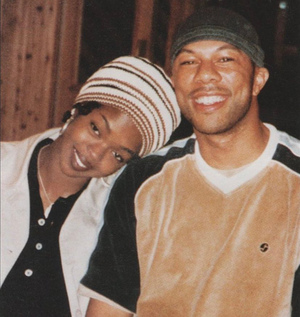I've dabbled in programming before through some web design classes in highschool and when I was briefly in college for Computer Science.
But I can't do this regular job s*** no more. Pay is wack for all the work they want me to do, so I'm trying to branch into something different. I've wanted to break into IT for some time now, but I haven't known where to even begin and I'm always working full-time to pay for all the bills I have now. So I'm trying my hand at programming on my pops recommendation and want to know if there's any programmers here?
What language is the best to try at, can do I this just on online videos and self help books? Any certs I would need to tackle to get an actual job in the field?
what language?
i'm a front-end developer and keeping up with the last 5 years has been a job of its own to be honest
i write HTML, CSS, JS and i use Vue, Bootstrap and some other frameworks but i wouldn't call myself a program, just a dev or designer tbh
lots of programmers here if I recall correctly
the language you start with ultimately depends on what you wanna do
python is a great language for beginners tbh and used alot in IT
figure out what it is you’d want to do first tho, IT is huge
 TIIMMY BURNER
TIIMMY BURNERI've dabbled in programming before through some web design classes in highschool and when I was briefly in college for Computer Science.
But I can't do this regular job s*** no more. Pay is wack for all the work they want me to do, so I'm trying to branch into something different. I've wanted to break into IT for some time now, but I haven't known where to even begin and I'm always working full-time to pay for all the bills I have now. So I'm trying my hand at programming on my pops recommendation and want to know if there's any programmers here?
What language is the best to try at, can do I this just on online videos and self help books? Any certs I would need to tackle to get an actual job in the field?
I'm a CS major technically but have only really completed my general coursework and will begin my more degree-focused s*** this upcoming fall semester, but here's my two cents
Like @Jozen said, your first language usually depends on what you want to achieve with code. Think of a project you'd like and can see yourself doing, is it a website? A mobile app? A video game? Maybe some data a***ysis type stuff or more complex subjects like machine learning and AI? Do you want a language that you can do a whole lot of different stuff with? Imma give a brief low-level rundown on some popular languages real quick from what I've learned over the years being into tech and trying many different languages without much success because I'm a lazy s*** head
HTML/CSS: Not technically languages but syntax. The building blocks of any website. If you want to get into any aspect of web development, you absolutely without a doubt start with these two and 99.99% of the time will move to JavaScript.
JavaScript: One of the core technologies of the world wide web. Powers 97% of all websites in some way. Not related to Java. Lots of job opportunities for JS developers. Learn HTML/CSS first then go here.
Python: Great for beginners, but also extremely popular and not "beginners only" if that makes sense. Does things like power web apps with Django or Flask (in addition to HTML/CSS of course), a***yze and visualize data, web scraping, automate s***, the list goes on.
C#: Pronounced "C-sharp", developed by Microsoft as a faster and more secure variant of the C language. Pretty old stuff, but it's the primary language used when building things for Windows. Can also be used to program video games and stuff.
C++: Often used for programming application systems rather than the application themselves if that makes sense. Can do lots of neat mathematical stuff. Also can code video games with this.
Go: Like Python kinda, but a lot faster. Netflix, Twitch, and Uber among others are powered by Go. Not as easy to pick up as Python and definitely not remotely close to as widely used, so has a lot less libraries vs Python.
R: Data a***ysis, machine learning, that sort of thing. Pretty much does a few things and does them extremely well, in this case working with statistics and data.
Swift: The Apple programming language, and successor to Objective-C. Used to build apps for iOS, macOS, etc, but also has other applications like web development through the Vapor framework. If you want to make iPhone apps this is your only choice really.
I could go on and on but if you're interested in any others, check out Ruby (and Ruby on Rails for web dev), Haskell, Kotlin, Rust, Java, Scala, Perl, etc. just google some in-demand languages and find one you like.
THAT BEING SAID
The most important thing is not finding a first language you'll want to do forever. It's about finding one you can use to do something you'd like in terms of a project, then learning the fundamentals of computer science along the way. Learn basics like variables, constants, arrays, etc etc and how the language actually works.Once you are pretty decent at your first language of choice, learning another is not going to be nearly as difficult because you understand the concepts now, it's more about syntax and other things unique to a different language.
Learn by making projects and googling questions you think of, but don't just copy+paste code from StackOverflow, actually understand why it works that way. Read some books on the language you choose, and watch videos or subscribe to like a course on Udemy or something. Join a Slack channel with other developers/learners, maybe even join an IRC channel. And don't burn yourself out early.
You never learn it all. You will always be learning in this career because languages are ever evolving. Just keep learning and don't give up on it or switch languages after 2 weeks or whatever, really really understand the language you choose before trying another. Good luck man
 cigaM
cigaMwhat language?
i'm a front-end developer and keeping up with the last 5 years has been a job of its own to be honest
i write HTML, CSS, JS and i use Vue, Bootstrap and some other frameworks but i wouldn't call myself a program, just a dev or designer tbh
Started on learning JS just cause I'm seeing it's the easiest to get into but I want to pick up CSS next I believe. What qualifications do I need to land a job in the field?
 TIIMMY BURNER
TIIMMY BURNERStarted on learning JS just cause I'm seeing it's the easiest to get into but I want to pick up CSS next I believe. What qualifications do I need to land a job in the field?
Learn one of them hip JavaScript frameworks like vue js or react js
 TIIMMY BURNER
TIIMMY BURNERStarted on learning JS just cause I'm seeing it's the easiest to get into but I want to pick up CSS next I believe. What qualifications do I need to land a job in the field?
Learn NextJS
JS + Something like C# (Asp .NET) is also very useful. But i'd tell you to look up what type of job offers are in your area, the type of language / framework can differ per region
 kttmz 💛May 20, 2021·2 replies
kttmz 💛May 20, 2021·2 replies ziggy
ziggyLearn NextJS
If you're going into web development (or any other direction) it's important to understand fundamentals first and foremost. In this case learn HTML/CSS and basic (vanilla) JS at start. Then you can look into frameworks like React/Vue paired with something like NextJS or Gatsby. There are so many frameworks it's key to know concepts instead of a framework. As @dude points out programming basics are the pathway to different languages.
The most important thing is not finding a first language you'll want to do forever. It's about finding one you can use to do something you'd like in terms of a project, then learning the fundamentals of computer science along the way. Learn basics like variables, constants, arrays, etc etc and how the language actually works. Once you are pretty decent at your first language of choice, learning another is not going to be nearly as difficult because you understand the concepts now, it's more about syntax and other things unique to a different language.
If you want to go into web development, I would recommend different frontend starting courses: HTML/CSS/JS fundamentals, project setup (JS compilers, CSS precompilers, bundeling, package managers), a framework like React/Vue, rendering a webpage (serverside / client side) -> NextJS/Gatsby. For REST api's probably a language like Golang.
 kttmz
kttmzIf you're going into web development (or any other direction) it's important to understand fundamentals first and foremost. In this case learn HTML/CSS and basic (vanilla) JS at start. Then you can look into frameworks like React/Vue paired with something like NextJS or Gatsby. There are so many frameworks it's key to know concepts instead of a framework. As @dude points out programming basics are the pathway to different languages.
The most important thing is not finding a first language you'll want to do forever. It's about finding one you can use to do something you'd like in terms of a project, then learning the fundamentals of computer science along the way. Learn basics like variables, constants, arrays, etc etc and how the language actually works. Once you are pretty decent at your first language of choice, learning another is not going to be nearly as difficult because you understand the concepts now, it's more about syntax and other things unique to a different language.
If you want to go into web development, I would recommend different frontend starting courses: HTML/CSS/JS fundamentals, project setup (JS compilers, CSS precompilers, bundeling, package managers), a framework like React/Vue, rendering a webpage (serverside / client side) -> NextJS/Gatsby. For REST api's probably a language like Golang.
I think if someone is learning JS a good next step would be learning how frameworks work and what they really are
I'd maybe even recommend trying TS, Python or C# first before learning any of the other things. Most of my programming i've learned myself and all of those things you listed i've learned just by googling when I needed them. I think when you learn to think like a programmer you pretty quickly turn into someone that waits for an error (in this case not knowing something) then try to find a solution
I think learning all of those things in courses would be useful but in the long run you remember things better if you found them when you needed them
That's just my opinion though.
 kttmz 💛May 20, 2021
kttmz 💛May 20, 2021 ziggy
ziggyI think if someone is learning JS a good next step would be learning how frameworks work and what they really are
I'd maybe even recommend trying TS, Python or C# first before learning any of the other things. Most of my programming i've learned myself and all of those things you listed i've learned just by googling when I needed them. I think when you learn to think like a programmer you pretty quickly turn into someone that waits for an error (in this case not knowing something) then try to find a solution
I think learning all of those things in courses would be useful but in the long run you remember things better if you found them when you needed them
That's just my opinion though.
Frameworks are important, but I think certain fundamentals are more crucial. I mean frameworks come and go (bye bye Angular), but concepts remain. However I agree on learning on the go, I listed these "courses" more as a direction what (to me) seem like logical steps for information. I think Python and C# would be more beneficial than TS because those paint are better picture about typed languages. Hence why I thought that Golang is a pretty good language to learn as well.
 piz
pizI'm a CS major technically but have only really completed my general coursework and will begin my more degree-focused s*** this upcoming fall semester, but here's my two cents
Like @Jozen said, your first language usually depends on what you want to achieve with code. Think of a project you'd like and can see yourself doing, is it a website? A mobile app? A video game? Maybe some data a***ysis type stuff or more complex subjects like machine learning and AI? Do you want a language that you can do a whole lot of different stuff with? Imma give a brief low-level rundown on some popular languages real quick from what I've learned over the years being into tech and trying many different languages without much success because I'm a lazy s*** head
HTML/CSS: Not technically languages but syntax. The building blocks of any website. If you want to get into any aspect of web development, you absolutely without a doubt start with these two and 99.99% of the time will move to JavaScript.
JavaScript: One of the core technologies of the world wide web. Powers 97% of all websites in some way. Not related to Java. Lots of job opportunities for JS developers. Learn HTML/CSS first then go here.
Python: Great for beginners, but also extremely popular and not "beginners only" if that makes sense. Does things like power web apps with Django or Flask (in addition to HTML/CSS of course), a***yze and visualize data, web scraping, automate s***, the list goes on.
C#: Pronounced "C-sharp", developed by Microsoft as a faster and more secure variant of the C language. Pretty old stuff, but it's the primary language used when building things for Windows. Can also be used to program video games and stuff.
C++: Often used for programming application systems rather than the application themselves if that makes sense. Can do lots of neat mathematical stuff. Also can code video games with this.
Go: Like Python kinda, but a lot faster. Netflix, Twitch, and Uber among others are powered by Go. Not as easy to pick up as Python and definitely not remotely close to as widely used, so has a lot less libraries vs Python.
R: Data a***ysis, machine learning, that sort of thing. Pretty much does a few things and does them extremely well, in this case working with statistics and data.
Swift: The Apple programming language, and successor to Objective-C. Used to build apps for iOS, macOS, etc, but also has other applications like web development through the Vapor framework. If you want to make iPhone apps this is your only choice really.
I could go on and on but if you're interested in any others, check out Ruby (and Ruby on Rails for web dev), Haskell, Kotlin, Rust, Java, Scala, Perl, etc. just google some in-demand languages and find one you like.
THAT BEING SAID
The most important thing is not finding a first language you'll want to do forever. It's about finding one you can use to do something you'd like in terms of a project, then learning the fundamentals of computer science along the way. Learn basics like variables, constants, arrays, etc etc and how the language actually works.Once you are pretty decent at your first language of choice, learning another is not going to be nearly as difficult because you understand the concepts now, it's more about syntax and other things unique to a different language.
Learn by making projects and googling questions you think of, but don't just copy+paste code from StackOverflow, actually understand why it works that way. Read some books on the language you choose, and watch videos or subscribe to like a course on Udemy or something. Join a Slack channel with other developers/learners, maybe even join an IRC channel. And don't burn yourself out early.
You never learn it all. You will always be learning in this career because languages are ever evolving. Just keep learning and don't give up on it or switch languages after 2 weeks or whatever, really really understand the language you choose before trying another. Good luck man
This is actually great advice

I appreciate the replies itt going to digest them more once I'm off and home. As someone starting from essentially scratch it's quite a lot to take in and quite a lot to learn but I'm hoping to keep sticking with it.
prepare to endure the biggest patience test of your life.
programming can be very tiresome if you don’t persist to find the bugs in your code or have insane googling skills.
I’d suggest that you plan ahead with sketches or write down/draw every step or get into the habit of doing little tasklists, this can speed up work tenfold and avoid your burnout.
Also practise as much as you can, writing proper code is on repetition. The rest is mainly being able to think ahead and imagining all the scenarios your program could fail or put yourself on the mind of the end user.
definitely recommend python. super readable and easy (comparatively) to learn
as far as resources go, udemy and skillshare is where i learned a lot of it
People already gave good advice on language and stuff, so I'll say to try to learn about data structures. That's stuff like arrays, trees, hashtables, etc. You'll need em no matter where your programming takes you. That said they'll be confusing when you start off, but I'd still get used to working with arrays
Try to work on projects, I know this will seen really hard when starting but having stuff on your github is essential for programming jobs. Its also easier to be motivated to code as practice when you're seeing a result.
Also think of what you want to work on, you'll learn basics for a bit but at a point you'll have some choice in where to go next. This may be web design, data anaylsis, cybersecurity etc, but regardless your decision should be based on the projects you'll be working on, not the language or anything like that.
Employers actually love self educated programmers, because if you can overcome that first learning curve without assistance, chances are you'll be able to learn whatever else you need to. Good luck!just remember that the work you do outside of your IDE is way way way more important and time-consuming than actually writing your code. once you've moved onto larger and more challenging projects, you want to be in a habit of mapping out the majority of your work beforehand. learning how to problem solve effectively is a lot more important than knowing how to code, you can always google syntax and look s*** up. actually learning the process takes a long time and requires a lot of active effort
Oh last thing If you've been debugging your program for hours and still dont know what's wrong, look up the documentation on whatever functions you're using. Sometimes things act slightly different from how we expect and this can change things (for example, arrays are usually numbered at 0, but some languages start at 1)
 TIIMMY BURNER
TIIMMY BURNERStarted on learning JS just cause I'm seeing it's the easiest to get into but I want to pick up CSS next I believe. What qualifications do I need to land a job in the field?
HTML + CSS + JS + frameworks
= front end development job
 kttmz
kttmzIf you're going into web development (or any other direction) it's important to understand fundamentals first and foremost. In this case learn HTML/CSS and basic (vanilla) JS at start. Then you can look into frameworks like React/Vue paired with something like NextJS or Gatsby. There are so many frameworks it's key to know concepts instead of a framework. As @dude points out programming basics are the pathway to different languages.
The most important thing is not finding a first language you'll want to do forever. It's about finding one you can use to do something you'd like in terms of a project, then learning the fundamentals of computer science along the way. Learn basics like variables, constants, arrays, etc etc and how the language actually works. Once you are pretty decent at your first language of choice, learning another is not going to be nearly as difficult because you understand the concepts now, it's more about syntax and other things unique to a different language.
If you want to go into web development, I would recommend different frontend starting courses: HTML/CSS/JS fundamentals, project setup (JS compilers, CSS precompilers, bundeling, package managers), a framework like React/Vue, rendering a webpage (serverside / client side) -> NextJS/Gatsby. For REST api's probably a language like Golang.
project setup is actually extremely important to learn and one of the most recent things i learned while working on a large project
 piz
pizI'm a CS major technically but have only really completed my general coursework and will begin my more degree-focused s*** this upcoming fall semester, but here's my two cents
Like @Jozen said, your first language usually depends on what you want to achieve with code. Think of a project you'd like and can see yourself doing, is it a website? A mobile app? A video game? Maybe some data a***ysis type stuff or more complex subjects like machine learning and AI? Do you want a language that you can do a whole lot of different stuff with? Imma give a brief low-level rundown on some popular languages real quick from what I've learned over the years being into tech and trying many different languages without much success because I'm a lazy s*** head
HTML/CSS: Not technically languages but syntax. The building blocks of any website. If you want to get into any aspect of web development, you absolutely without a doubt start with these two and 99.99% of the time will move to JavaScript.
JavaScript: One of the core technologies of the world wide web. Powers 97% of all websites in some way. Not related to Java. Lots of job opportunities for JS developers. Learn HTML/CSS first then go here.
Python: Great for beginners, but also extremely popular and not "beginners only" if that makes sense. Does things like power web apps with Django or Flask (in addition to HTML/CSS of course), a***yze and visualize data, web scraping, automate s***, the list goes on.
C#: Pronounced "C-sharp", developed by Microsoft as a faster and more secure variant of the C language. Pretty old stuff, but it's the primary language used when building things for Windows. Can also be used to program video games and stuff.
C++: Often used for programming application systems rather than the application themselves if that makes sense. Can do lots of neat mathematical stuff. Also can code video games with this.
Go: Like Python kinda, but a lot faster. Netflix, Twitch, and Uber among others are powered by Go. Not as easy to pick up as Python and definitely not remotely close to as widely used, so has a lot less libraries vs Python.
R: Data a***ysis, machine learning, that sort of thing. Pretty much does a few things and does them extremely well, in this case working with statistics and data.
Swift: The Apple programming language, and successor to Objective-C. Used to build apps for iOS, macOS, etc, but also has other applications like web development through the Vapor framework. If you want to make iPhone apps this is your only choice really.
I could go on and on but if you're interested in any others, check out Ruby (and Ruby on Rails for web dev), Haskell, Kotlin, Rust, Java, Scala, Perl, etc. just google some in-demand languages and find one you like.
THAT BEING SAID
The most important thing is not finding a first language you'll want to do forever. It's about finding one you can use to do something you'd like in terms of a project, then learning the fundamentals of computer science along the way. Learn basics like variables, constants, arrays, etc etc and how the language actually works.Once you are pretty decent at your first language of choice, learning another is not going to be nearly as difficult because you understand the concepts now, it's more about syntax and other things unique to a different language.
Learn by making projects and googling questions you think of, but don't just copy+paste code from StackOverflow, actually understand why it works that way. Read some books on the language you choose, and watch videos or subscribe to like a course on Udemy or something. Join a Slack channel with other developers/learners, maybe even join an IRC channel. And don't burn yourself out early.
You never learn it all. You will always be learning in this career because languages are ever evolving. Just keep learning and don't give up on it or switch languages after 2 weeks or whatever, really really understand the language you choose before trying another. Good luck man
this almost makes me want to pick up another try with it. But I remember hating computer science class in high school lol
Was actually looking into learning to program so this thread is a great find.
i'll probably do python
 kttmz 💛May 21, 2021
kttmz 💛May 21, 2021 cigaM
cigaMproject setup is actually extremely important to learn and one of the most recent things i learned while working on a large project
Exactly, it also makes you understand why certain frameworks choose to work in a certain way. What's happening with bundling for a live reload, how does the build step work and what options are there. As you say this differs quite a lot between small and large projects.
 Nine Arts Dragon
Nine Arts DragonWhat’s a good language for cybersec, i know a bit of Python
bash, C++, C#/Java, perl, javascript.
Stated best from /cybersoaker:
"Depends on what type of things you're doing in info sec.
Low level / kernel level exploits? C and x86
Doing data forensics? Python works well here
Web attacks? Javascript
Remote code injection? Javascript and SQL
Theres a whole lot more to cyber sec than this; but if i went down the cyber sec route instead of sys admin; I would recommend x86, C, Python, Javascript, SQL and Bash as well as popular markup or data exchange formats like XML, JSON, YAML, etc. And probably a passing understanding of network protocols, (HTTP, SSH, etc)
If I had to pick favorites? Python is a very nice general purpose language. But this is a 'right tool for the job' type thing. Plus a lot of the time you'll probably be using prewritten tools if you're doing some kind of pen testing or security research."